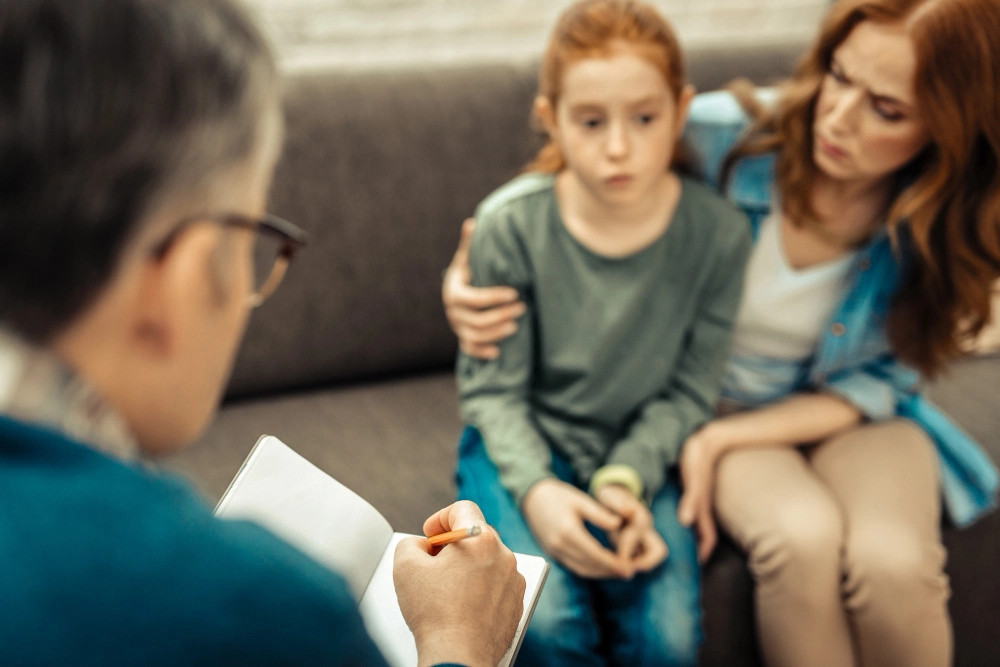Spotting the Signs: How to Recognize Mental Health Challenges in Kids and Teens
GloFusion Behavioral Health Services | Griffin, GA
Childhood and adolescence are a time of growth, change, and exploration, often accompanied by emotional ups and downs. But when do those mood shifts or behavioral changes signal something more than typical growing pains? Mental health challenges in kids and teens often go unnoticed, as many young people struggle to articulate what they’re feeling or may lack the confidence to ask for help.
As a parent, recognizing these signs early is critical for your child’s well-being. At GloFusion Behavioral Health Services in Griffin, GA, we’re here to guide you in identifying potential mental health challenges and provide compassionate, customized support for your child and family.

Page Contents
Emotional Red Flags to Watch For to Recognize Mental Health in Kids and Teens
Emotional ups and downs are common during childhood and adolescence, but extreme or prolonged changes in mood may indicate a deeper issue. Pay attention to these emotional warning signs:
1. Persistent Sadness or Withdrawal
If your child seems constantly down, tearful, or withdrawn for more than two weeks, it could be a sign of depression.
2. Excessive Worry or Fear
Constant anxiety about everyday situations—such as school, friendships, or family life—may signal an anxiety disorder.
3. Irritability or Anger
Frequent mood swings, outbursts, or an unusually short temper could mask feelings of frustration, sadness, or fear.
4. Feelings of Hopelessness or Low Self-Worth
Statements like “I’ll never be good enough” or “What’s the point of trying?” should be taken seriously as potential indicators of depression.
💡 Parent Tip: Encourage open communication. Let your child know it’s okay to talk about their feelings and reassure them that support is available.
Behavioral changes that indicate mental health concern in Kids or Teens
Mental health struggles often present as noticeable changes in your child’s behavior. Be mindful of these common behavioral red flags:
1. Withdrawal from Social Activities
Avoiding friends, family, or previously enjoyed hobbies may be a sign of depression or social anxiety.
2. Declining Academic Performance
A sudden drop in grades, difficulty concentrating, or lack of interest in schoolwork could indicate stress, anxiety, or ADHD.
3. Changes in Sleep Patterns
Insomnia, excessive sleeping, or frequent nightmares may point to anxiety or depression.
4. Risky or Self-Destructive Behaviors
Experimenting with drugs or alcohol, engaging in self-harm, or showing reckless behavior are critical warning signs that need immediate attention.
💡 Parent Tip: Approach your child with empathy when discussing their behavior. Avoid judgment and focus on understanding their experience.
Physical Symptoms of Mental Health Challenges
Mental health issues can also manifest as physical symptoms, which may be misinterpreted as purely medical problems. Watch for:
1. Frequent Headaches or Stomachaches
Anxiety and stress commonly present as physical discomfort, especially in the form of headaches or stomachaches.
2. Unexplained Fatigue
Chronic tiredness, even after adequate sleep, could be a sign of depression or emotional exhaustion.
3. Changes in Appetite
Sudden increases or decreases in appetite may reflect emotional distress.
4. Physical Signs of Self-Harm
Look for unexplained cuts, burns, or bruises, particularly on areas like the arms, legs, or wrists.
💡 Parent Tip: If your child frequently complains about physical symptoms without a clear medical explanation, consider exploring their mental health as a potential factor.

How to Respond When You Notice Red Flags
Discovering that your child may be struggling with their mental health can feel overwhelming, but taking action early can make all the difference. Here’s how to support your child effectively:
1. Start a Conversation
Choose a calm, distraction-free time to talk. Use open-ended questions like, “I’ve noticed you’ve been quieter than usual. Can we talk about how you’re feeling?”
2. Validate Their Feelings
Avoid dismissing your child’s emotions with phrases like, “It’s just a phase.” Instead, say, “It’s okay to feel this way, and I’m here to help you through it.”
3. Seek Professional Support
If the warning signs persist, reach out to a mental health professional for an assessment. At GloFusion in Griffin, GA, we specialize in providing care for children and teens in a safe and compassionate environment.
4. Create a Supportive Home Environment
Foster a stable routine, encourage healthy habits like exercise and proper nutrition, and model open communication about emotions.
💡 Parent Tip: Reassure your child that seeking help is a sign of strength and that they don’t have to face their struggles alone.
How GloFusion Behavioral Health Services Can Help
At GloFusion in Griffin, GA, we understand how deeply a child’s mental health can impact the entire family. Our approach combines evidence-based practices with compassionate care to provide the support your child needs to flourish.
Our Services Include:
- Comprehensive Assessments
- We evaluate your child’s emotional, behavioral, and physical health to develop a personalized treatment plan.
- Therapeutic Interventions
- We offer a range of age-appropriate, evidence-based therapies, including Cognitive Behavioral Therapy (CBT), play therapy, and mindfulness techniques.
- Family-Centered Care
- We actively involve parents and caregivers in the process, equipping your family with the tools and strategies needed to support your child.
- Holistic Support
- Our holistic approach integrates stress management, mindfulness, and other practices to promote overall mental and emotional wellness.
Take the First Step Toward Healing
Recognizing the red flags of mental health challenges in kids and teens can feel daunting, but awareness is the first step toward healing. Early intervention allows your child to overcome challenges, build resilience, and thrive.
At GloFusion Behavioral Health Services in Griffin, GA, we’re here to provide expert, compassionate care for your child and family.

